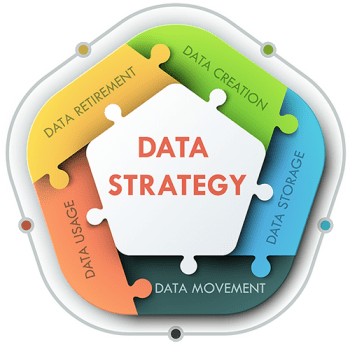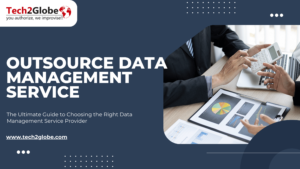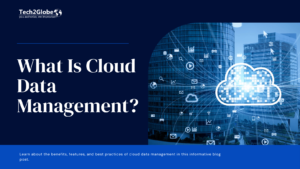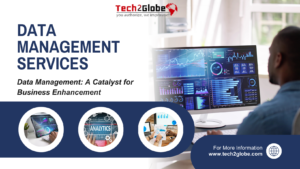An enormous volume of data can be overwhelming and useless if it is not properly managed. But with the right tools, Big Data can be utilized to provide organizations with more in-depth analyses and accurate projections than ever before. Based on the learning data management service provider can help organizations provide outstanding customer experiences and better understand what customers desire. Big data can also be used to create new data-driven business models without the ability to analyze and comprehend it, such as service offers based on the real-time Internet of Things (IoT) and tracking devices.
What More in Data Management Services?
It goes without saying that companies that are data-driven have a big advantage over their competitors. Because of sophisticated tools, businesses can now manage more data from more data management services sources than ever before. Further, they have real-time access to a variety of data sources, both structured and unstructured, such as data from Internet of Things (IoT) devices, audio, and video files, clickstream data from the Internet, and comments from social media websites. As a result, there are more options to profit from and utilize data.
The digital revolution runs on data, and that is a true statement. Industry 4.0, advanced analytics, the Internet of Things, intelligent automation, and artificial intelligence (AI) all require a tonne of timely, accurate, and safe data to function.

Benefits of Data Management in Business
- Security
Data security and privacy are essential functions of data management. With rising regulations such as Europe’s General Data Protection Regulation (GDPR) and HIPAA, the risks of failing to secure your data can be highly significant. Fair security depends heavily on data governance and catalogs, letting you know where sensitive data is stored, whether it should be encrypted, and which users and groups should have access. In the event of a data violation, the metadata in data catalogs can allow you to understand the scope of the data that has been compromised, which can dramatically limit potential fines.
- Reliability
Consider making business judgments based on quicksand: fluctuating, untrustworthy data that eats you whole. Not very motivating, is it? Trusted data management offers you a lifeline. Clean data provides a solid foundation for strategic planning, ensuring that your steps do not lead to costly mistakes, and gives accurate analysis, transforming data into reliable insights. Not only that, but it ensures compliance and client confidence. You can adjust to market swings like a chameleon, responding fast to shifting demands since your data is clear. This reliable data is the heart of a flexible, agile organization, pulsing through every function.
- Improves Decision Making
Data plays a crucial role in making confident decisions, such as product launches, marketing messages, market expansion, etc. Data is logical and concrete, unlike gut instinct or intuition, instilling confidence in the organization and allowing for full commitment to a vision or strategy. However, data-based decisions may not always be correct, as flawed data collection or interpretation can lead to inaccurate outcomes.
Just because a decision is founded on data doesn’t mean it will always be correct. While the data might show a particular pattern or suggest a specific outcome, if the data collection process or interpretation is flawed, any decision based on the data would be inaccurate. This is why the result of every business decision should be regularly measured and monitored.
- Visibility
Have you ever searched through your attic looking for the ideal photo, only to come up empty? Data management is similar to arranging a messy attic and transforming it into a treasure trove. This improved visibility ensures that your company’s essential data does not accumulate dust in forgotten corners.
Data management does more than only guide the way; it also makes the journey easier. No more searching for stray spreadsheets or dealing with hidden file names. Information flows freely, which improves productivity and organization. Consider employees rushing through their responsibilities, certain that the proper information is always just a click away.
- Help Comply with Regulations
Good data management in business has clear benefits when it comes to following rules. By sticking to the right data practices, companies make sure they are meeting all the regulations that apply to them. Through this practice your business operations can avoid legal troubles and fines. Keeping records accurate and updated is key to showing that a business is doing what it’s supposed to according to the rules. When regulatory bodies check in, having good data management makes audits go smoothly. Also, businesses that can adjust to new rules, makes it easier to keep following the standards.
Systems And Components For Managing Data
Outsource Data Management Services systems, which are composed of numerous components and functions that work together to help you make the most of your data, are built on top data management companies. Analytics, data integration tools, database management systems, data lakes and warehouses, and other tools may be among them.
- Databases Management Systems (DBMS)
There are many different types of Data management solutions. The most well-liked ones are object-oriented database management systems, relational database management systems, in-memory databases, and columnar databases.
- Relational Database Management System (RDBMS)
An RDBMS is a database management system that has data definitions so that applications and retrieval systems can refer to data items by name instead of having to define the location and structure of the data repeatedly. To facilitate access and avoid duplication, RDBMS systems create associations between data elements based on the relational model. For instance, after being saved once, the basic description and characteristics of an item are linked to pricing tables and customer order information lines.
- Object-Oriented Database Management System (OODBMS)
It uses a unique method for data definition and storage, was developed by OOPS developers, and is used today. Data is retained as objects, which are independent, self-described structures, as opposed to tables, as it would be in an RDBMS.
- In-Memory Database
IMBD uses a computer’s RAM (main memory) to store data instead of a hard drive. In-memory databases are widely used by applications that demand quick response times since retrieving data from memory is much quicker than retrieving data from a disk-based system. For instance, information that once needed to be gathered over several days can now be accessed and analyzed in a matter of minutes or even seconds.
- Collapsible Databases
For ease of access, these databases group together collections of related data (a “column” of data). It is used in numerous independent data warehousing systems and modern in-memory business applications where retrieval speed (of a confined amount of data) is essential.
Choose Tech2Globe As Your Trusted Data Management Service Provider
Data management as a service (DMaaS) is a cloud service offering organizations centralized storage for several data sources. When we talk about ‘as a service,’ we’re referring to a business model in which you pay for what you consume.
Tech2Globe can be your go-to service provider that genuinely stands out. But how and why? The first reason is that our expertise guarantees that your critical information remains secure and easily accessible.
Our staff is more than tech-savvy data wranglers; because we have industry experts who understand your area’s particular issues. We don’t simply store, manage, and safeguard your data; we become its committed gardeners. We use new techniques and great care to assure data’s health and security, with openness and cooperation at the forefront of all we do. By hiring us as a data management service provider, you receive more than simply data management. We’ll collaborate to help your data thrive, boosting your organization’s development and resilience.
Tech2Globe’s services exceed immediate needs; we actively support the business’s growth and success.
Also, our business analysts, architects, and developers have the abilities and knowledge to create robust software that ensures full-cycle data management, which involves data collection, cleaning, cost-effective storage, and safe sharing.
Whatever specialist support you want, whether selecting the best technology, obtaining credible TCO and ROI estimations, or architectural (re)design, we’ll give you actionable deliverables to ensure that your data becomes a valuable business asset.
Conclusion
Data are the source of information, as we are all too aware. And if the information is power, then your company’s superpower may very well be its capacity to effectively manage and capitalize on its data. Data management services responsibilities and the job of database analysts (DBAs) are growing in importance in order to promote cloud adoption, capitalize on emerging trends and technologies, and offer strategic value to the business.










